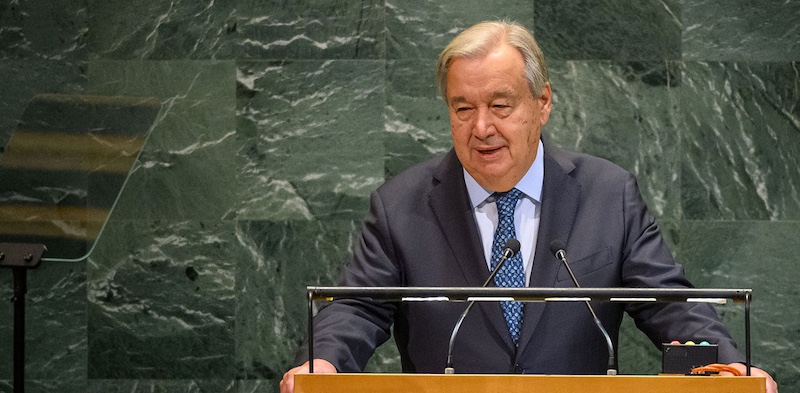Artificial intelligence has become a central issue for global security, with the United Nations warning that autonomous weapons are moving from theory to battlefield reality.
In a Security Council debate on artificial intelligence and peace and security, Secretary-General António Guterres called for urgent international action to regulate military uses of AI.
“AI is no longer a distant horizon – it is here, transforming daily life, the information space and the global economy at breathtaking speed,” Guterres told the Council.
Used responsibly, he said, AI could help prevent violence, support de-mining and identify outbreaks of conflict. But “without guardrails, it can also be weaponized”.
Guterres warned that “recent conflicts have become testing grounds for AI-powered targeting and autonomy”, a point underscored by the war in Ukraine.
Autonomous drones and loitering munitions are increasingly deployed on both sides of the Russia-Ukraine war, raising fears that algorithms rather than human commanders are edging closer to making life-and-death decisions.
“Humanity’s fate cannot be left to an algorithm,” Guterres stressed. “Humans must always retain authority over life-and-death decisions.”
He reiterated his call for a ban on lethal autonomous weapons systems operating without human control, urging the adoption of a legally binding instrument by 2026. Until nuclear weapons are eliminated, he said, any decision on their use “must rest with humans – not machines”.
The Secretary-General also called for coherent global frameworks to regulate AI from design to deployment, stronger safeguards against military misuse, and urgent measures to protect information integrity in conflict zones. “Innovation must serve humanity – not undermine it,” he said.
Experts and leaders across the UN system echoed his concerns. Yoshua Bengio, Professor at Université de Montréal, cautioned that despite trillions invested, “scientists still do not know how to design AIs that will not harm people, that will always act according to our instructions”.
He warned: “If we don’t learn how to build trustworthy AI, humans are under threat from AI misuse by bad actors or through the misalignment of AI systems with societal norms and laws.”
Yejin Choi, Professor of Computer Science at Stanford University, said: “We stand today at an extraordinary inflection point.” She urged that access, not concentration in the hands of a few nations and corporations, must be the “north star” for AI’s development.
World leaders highlighted how AI is already reshaping conflict. Nataša Pirc Musar, President of Slovenia, said: “The world has witnessed the growing digitalization of warfare.”
In Gaza, Sudan and Ukraine, she noted, “algorithms, armed drones and robots created by humans have no conscience. We cannot appeal to their mercy or beg them to spare their loved ones.”
Khawaja Muhammad Asif, Pakistan’s Defence Minister, warned that autonomous munitions had already been used between nuclear-armed states, while Greece’s Prime Minister Kyriakos Mitsotakis urged the Council to “govern the age of AI” as it once did for nuclear weapons.
Marcelo Rebelo de Sousa, President of Portugal, underscored: “Human control, decision and accountability must be at the heart of the use of force. It is a moral, ethical and legal responsibility that cannot – and should not – be delegated.”
With autonomous drones shaping the course of the Russia-Ukraine war and AI-enabled cyberattacks now routine in global conflicts, the UN debate underscored both the promise and peril of the technology.
As Guterres concluded: “The window is closing to shape AI – for peace, for justice, for humanity. We must act without delay.”
Main image: Secretary-General António Guterres addressing the United Nations General Assembly. Credit: UN/Loey Felipe.

